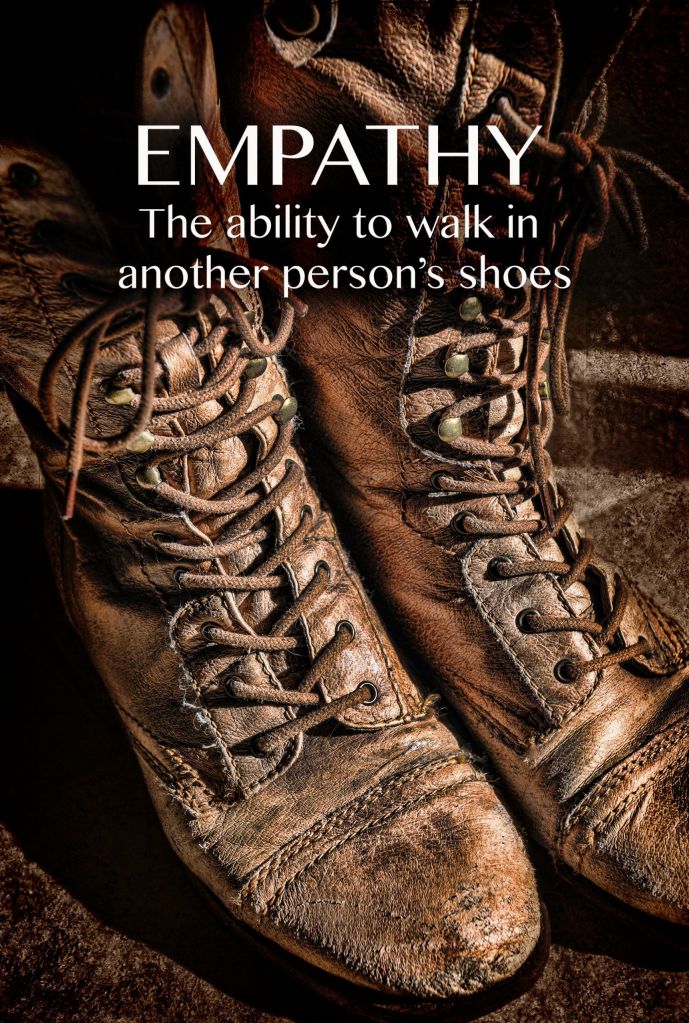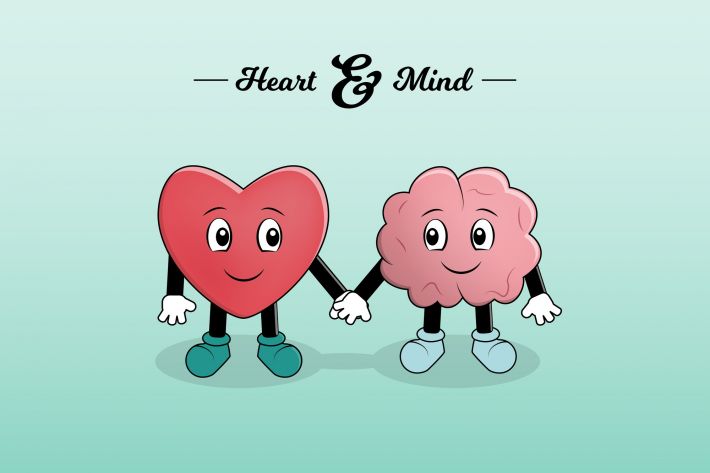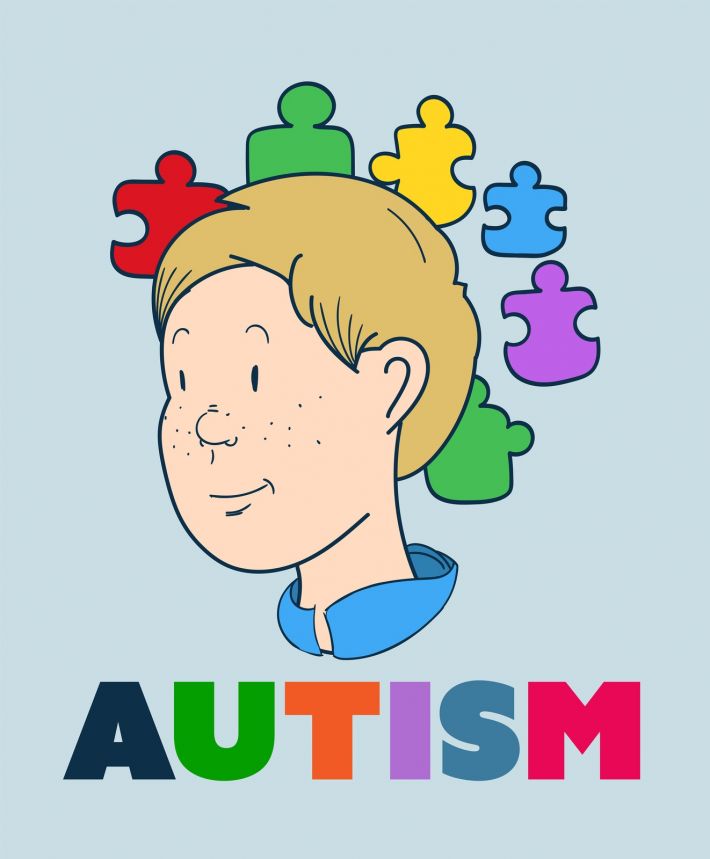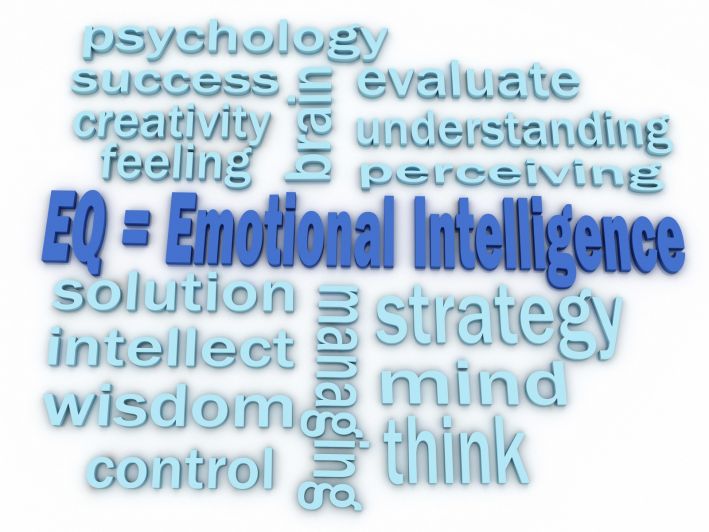- in Mental Health by Tony
- |
- 3 comments
Empathy in Mental health

Empathy is a natural human emotion, and it served our ancestors’ to thrive on being socially acceptable within society and sensitive to the needs of our offspring.
Now, anyone devoid of it strikes us as threatening or mentally ill. For example, the absence of empathy is often considered one of the distinctive features of narcissism and violent behaviour is also known for its lack of compassion.
More...
Empathy defined
We cringe with imagined pain as we watch someone fall or cry at a stranger’s loss as we witness their sorrow; these are common humanistic responses. It is often described as “the ability to see the world through someone else’s eyes”. (LeCompte A [2000]).
To be empathetic, we have to visualise what it would be like to be mentality in the head of others or to walk a mile in their shoes. Initially, empathy makes us reach out to others emotionally and then understand their situation and treat them with kindness.

Some of you may recognise this as good old-fashioned morals or bedside manner within the medical profession, but there is indeed a link between empathy and quality of care (Huggard, 2003)
Martin Clunes (actor) adequately displayed this as Doc Martin tribulations with his absence of altruism and fear of blood (hemophobia) contributed to some amusing encounters and sympathetic groans from the viewers of the British TV series that beggars belief.
Alternatively, as our stress hormone, cortisol, kicks into survival mode, our empathic nature then shuts down in the heat of the moment, focusing only on our particular pain and the innate need for self-preservation. However, this simplistic approach is questionable if you care to look at personality traits.

Some people, known as empaths, have such high empathy that they seem to take on the feelings of others, and their cortisol response is undoubtedly different in this case. They often respond more strongly to the pain and emotional distress others experience.
The mental load of feeling what everyone around you feels can also become too much and cause an increase of cortisol within the person. Empaths share all the traits of Dr Elaine Aron’s “Highly Sensitive People” or HSPs. Empaths are like sponges that absorb all the stress surrounding them, making them vulnerable to adrenal fatigue.
Brené Brown on empathy
Models of empathy
Most people believe there’s only one form of empathy. But did you know that there are three different levels of empathy?
Understanding the 3 Types of Empathy - Follow link to learn more?
They are affective, cognitive, and compassionate.
The following two components will define individual differences in empathy:
(1.) An affective component which refers to sharing in the emotions of others, recognising an emotion, and feeling it themselves. You may also find this is also called emotional empathy. Include mirroring what that person is feeling, or just feeling stressed, when we detect another’s fear or anxiety.
(2.) A cognitive component, sometimes called “perspective taking,” which refers to taking the perspective and understanding the emotions of another person.
Cognitive and the emotional sections of empathy are the precursors that move us towards compassionate empathy.
Compassionate empathy is the middle ground that accepts the natural connection between the brain and the heart. It is the motivation to do something about someone’s suffering. And to truly develop your ability to empathise, you need a healthy dose of all three.

Having developed cognitive empathy means taking responsibility for your life. And this can bring you closer to having greater success in your personal relationships and a greater connection with yourself.
A recent study shows that inducing empathy in white people reduces their feelings of prejudice and racism. The Interpersonal Reactivity Index (IRI) was used to measure the general empathic tendencies that assess both cognitive and affective empathy.
Four empathy subscales that include:
1. Fantasy, which denoted a tendency of the respondent to identify strongly with fictitious characters in books, movies, or plays.
2. Perspective-taking, which reflected a tendency or ability of the respondent to adopt the perspective, or point of view, of other people.
3. Empathic concern, these items assessed a tendency for the respondent to experience feelings of warmth, compassion and concern for others undergoing negative experiences.
4. Personal distress, which indicated that the respondent experienced feelings of discomfort and anxiety when witnessing the negative experiences of others.
Do you want to live in a world that is caring and compassionate?

For most of us, our point of empathy is directly related to our level of personal values and experience. In many respects, we have been socially shaped. Therefore, we can appreciate seemingly irrational behaviour and then tolerate poor judgment by sympathising with the individual within certain situations.
Thereby, it is possible to feel another person grief because we have felt that pain in our own lives. Studies suggest that people within the autism spectrum disorders have a hard time empathizing.

Having empathy doesn’t necessarily mean we’ll want to help someone in need, though it’s often a vital first step toward compassionate action.
In these circumstances, it is easy for us to continue this line of empathic perception into a broader sense of acceptance concerning our behaviour and choices others may perform at that particular moment.
Just consider the situation in which we have no experience or been socially conditioned, as mentioned previously, situations in which our emotional buttons are pushed, and we find ourselves caught in a reflexive, emotionally defensive response?
How can we cultivate our capacity for understanding and using empathy in these more challenging scenarios?
We could add Mental attitude, to our therapeutic tool box, which is a complex mental state involving beliefs, feelings, values, and dispositions to act in specific ways. Positive mental attitude (PMA) is a concept first introduced in 1937 by Napoleon Hill in the book, Think and Grow Rich.
Mental attitude is a complex mental state involving beliefs, feelings, values, and dispositions to act in specific ways. Positive mental attitude (PMA) is a concept first introduced in 1937 by Napoleon Hill in the book Think and Grow Rich.
Mental attitudes are a little like physical aptitudes. If we want to get good at something, we need to practise. Taking time to consider things from another person’s perspective is a mental habit worth establishing, especially for those uncertain situations in which we feel there is no point of connection.
Typically, using an exercise like Perceptual Positions is a fabulous way to build our tendency towards empathic understanding.
However, we don’t need to work with challenging relationships to cultivate empathy. By taking time to listen to others with an open and curious mind, we can build our awareness and understanding of the immense and varied lives our neighbours, colleagues and friends initiate behind polite facades and informal conversations.
Do you have an Empathy Mindset?
As individuals, we have been blessed with imagination. It is easy to use it to conjure up negative thoughts about the motives of others or consider the rationale behind their behaviours. Unfortunately, We don’t always use it as a blessing.
Sadly, it is much easier to believe the worst in people. The media feeds this passive and destructive mindset into our feelings of insecurity and self-judgement. With awareness, we can turn this around; our imagination can work for to improve our relationships.
By actively seeking to understand other people and consider their behaviours’ genuine intentions, we can train then our minds to gravitate towards acceptance and tolerance in our interactions.

Emotional intelligence

The classic book by Daniel Goleman (1998) on why EQ is more important than IQ” was published.
Emotional intelligence involves the following elements:
Self-awareness, empathy, handling relationships, managing feelings, motivation.
Empathy is so integral to emotional intelligence quotient (EQ) and learning to communicate with empathy can go a long way toward building more positivity in your relationships by connecting with those you love and work with.
Reference Section
LeCompte A (2000). Creating harmonious relationships: A practical guide to the power of empathy. Atlantic Books, Portsmouth
http://internationaljournalofcaringsciences.org/docs/vol1_issue3_03_ioannidou.pdf
https://greatergood.berkeley.edu/article/item/the_evolution_of_empathy
Huggard, P. (2003). Compassion fatigue: How much can I give? Medical Education, 37, 163-164.
- M.H. Davis (1980) A multidimensional approach to individual differences in empathy. JSAS Cat Select Doc Psychol, 10 (1980), p. 85
Empathy Mapping: The First Step in Design Thinking
Empathy” help teach children to recognise, understand and manage their emotions to develop empathy, make decisions, and build and maintain positive social relationships.
https://www.nngroup.com/articles/empathy-mapping/
Roots of Empathy
https://rootsofempathy.org/
What Is Empathy?
https://www.verywellmind.com/what-is-empathy-2795562
Six Habits of Highly Empathic Peoplehttps://greatergood.berkeley.edu/article/item/six_habits_of_highly_empathic_people1
If you think you’re hearing the word “empathy” everywhere, you’re right. It’s now on the lips of scientists and business leaders, education experts and political activists. But there is a vital question that few people ask: How can I expand my own empathic potential?
Empathy Definition | What Is Empathyhttps://greatergood.berkeley.edu/topic/empathy/definition
The term “empathy” is used to describe a wide range of experiences. Emotion researchers generally define empathy as the ability to sense other people’s emotions, coupled with the ability to imagine what someone else might be thinking or feeling.
The Evolution of Empathy.
https://greatergood.berkeley.edu/article/item/the_evolution_of_empathy
We tend to think of empathy as a uniquely human trait. But it’s something apes and other animals demonstrate as well, says primatologist Frans de Waal. He shows how our evolutionary history suggests a deep-rooted propensity for feeling the emotions of others. by FRANS DE WAAL | September 1, 2005.
The Three Kinds of Empathy: Emotional, Cognitive, Compassionate
https://blog.heartmanity.com/the-three-kinds-of-empathy-emotional-cognitive-compassionate#Emotional
Do you know what the three kinds of empathy are and how to express them? Empathy is a must-learn skill that brings more ease and understanding to your life and relationships!When a student tells you they’re overwhelmed or your partner is working from home and stresses—do you respond with empathy? Or do you react?Or how would you respond if your partner expressed fear, sadness, and anger telling you she got put on furlough or lost her job? And right after you dipped into savings to build an addition on your house! The ideal would be to respond thoughtfully and empathetically, but many of us react.
Why Emotional Intelligence Is Crucial—Learn to Master Key Skills
https://blog.heartmanity.com/why-emotional-intelligence-is-crucial-learn-to-master-key-skills
Emotional intelligence is my speciality, but it wasn’t always. As a young adult, I was angry all the time. Every day I had frequent meltdowns—yes, way too emotional with no ability to regulate my emotions. I felt continually jerked around by life’s challenges and other people’s expectations of me. As a teen, I was severely depressed; even when I was functional, anxiety and a brutal inner critic were my constant companions. Learning emotional intelligence changed everything for me. It gave me the tools and the encouragement that I needed to heal and create inner peace. It’s why I am so passionate about imparting these skills to others.
Cognitive Empathy vs. Affective Empathy
https://coachcampus.com/coach-portfolios/power-tools/theano-kalavana-cognitive-empathy-vs-affective-empathy/
Empathy is defined as “the ability to comprehend another’s feelings and to re-experience them oneself”. Empathy represents one of the most important aspects of emotionally intelligent behaviour (Salovey & Mayer, 1990, pp.194-195). Empathy involves both a cognitive (understanding another’s state) and an affective (sharing another’s state) component (Eisenberg, 2000). Great leadership hinges on understanding the difference and how to harness the unique power of each.
Empathy and emotional intelligence: What is it really about?
International Journal of Caring Sciences, 1(3):118–123
http://internationaljournalofcaringsciences.org/docs/vol1_issue3_03_ioannidou.pdf
Empathy is the "capacity" to share and understand another’s "state of mind" or emotion. It is often characterized as the ability to “put oneself into another’s shoes”, or in some way experience the outlook or emotions of another being within oneself. Empathy is a powerful communication skill that is often misunderstood and underused. Initially, empathy was referred to as “bedside manner”; now, however, authors and educators consider empathetic communication a teachable, learnable skill that has tangible benefits for both clinician and patient: Effective empathetic communication enhances the therapeutic effectiveness of the clinician-patient relationship.
Appropriate use of empathy as a communication tool facilitates the clinical interview, increases the efficiency of gathering information, and honours the patient. Additionally, Emotional Intelligence (EI), often measured as an Emotional Intelligence Quotient (EQ), describes a concept that involves the ability, capacity, skill or a self-perceived ability, to identify, assess, and manage the emotions of one’s self, of others, and of groups. Because it is a relatively new area of psychological research, the concept is constantly changing.
Six Habits of Highly Empathic People
https://greatergood.berkeley.edu/article/item/six_habits_of_highly_empathic_people1
If you think you’re hearing the word “empathy” everywhere, you’re right. It’s now on the lips of scientists and business leaders, education experts and political activists. But there is a vital question that few people ask: How can I expand my own empathic potential? Empathy is not just a way to extend the boundaries of your moral universe. According to new research, it’s a habit we can cultivate to improve the quality of our own lives.
How to Help Your Child Develop Empathy
https://www.zerotothree.org/resources/5-how-to-help-your-child-develop-empathy
Yes, you can help your child be more empathetic! Try these practical tips to help infants and toddlers develop empathy and understand that others have different thoughts and feelings than they do.
How to Stay Empathic without Suffering So Much
https://greatergood.berkeley.edu/article/item/how_to_stay_empathic_without_suffering_so_much
What happens when we feel empathy for another person? What are you feeling when that chronically anxious student sinks further into his chair or your teenage girl sobs through her closed bedroom door?
Empathy, or the capacity to “feel with” and share others’ emotions, can be a beautiful gift that connects us with each other. Yet it can also feel heart-wrenching and even unbearable at times. Researchers tell us that our initial empathic responses can shift in one of two directions—toward empathic distress or empathic concern.
The Limits of David Brooks’ “Limits of Empathy”
https://greatergood.berkeley.edu/article/item/the_limits_of_david_brooks_limits_of_empathy
There’s some truth to this. Research has not proven that empathy guarantees altruism. Sometimes, research suggests, feeling empathy toward someone who’s suffering may actually inhibit action: You may be so overwhelmed by the emotional response that you want to tune it out or ignore it, lest you really start to suffer yourself. While empathy for another’s suffering may motivate some to take compassionate action, it could motivate others to run away from suffering as quickly as they can.
How to Fight Stress with Empathy
https://greatergood.berkeley.edu/article/item/how_to_fight_stress_with_empathy
How many times have you been concerned about a friend or other loved one and asked if everything’s all right only to be told, “Oh, I’m just stressed,” as if there’s nothing to worry about?
We often use the words “I’m stressed” casually in our everyday conversations, with little acknowledgment of the adverse effects of stress in our lives. But evidence suggests that we should be much more concerned about our stress levels than we are.
The Center for Disease Control found that 66 percent of American workers say they lie awake at night troubled by the physical or emotional effects of stress, and stress has been linked to many health problems, including obesity and heart disease—especially among low-income Americans. Stress not only affects us, but it can impact those around us, too, especially our children.








[…] is for emotionally reactive. Overly Sensitive People are empaths and pick up on your mood. Research shows they also have an increased emotional connection to […]
[…] Be Supportive: Showing support for those around you is important for any healthy relationship. Whether it is offering emotional support or practical help, being there for someone when they need it can help strengthen the bond between you. […]
[…] work that resonates with readers across generations. Harper Lee's searing portrayal of racism, empathy, and loss of innocence forces us to confront uncomfortable truths about our own […]